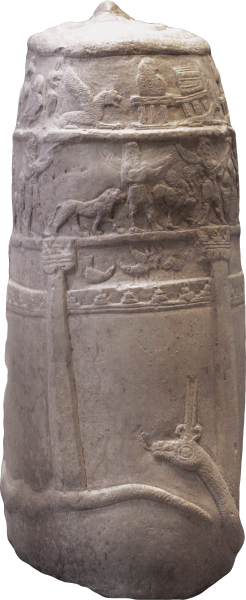Jonah’s Prayer (2:1–10)
Banished from your sight (2:4). Being banished from the presence of deity implies disqualification from access to the sacred precincts of the temple. In general one had to maintain a certain level of ritual purity to have access to sacred precincts. Jonah’s conclusion that he had been banished did not come from admitting that he had disobeyed, but resulted from his realization that death was imminent. His deliverance by the fish fosters the hope that he will again appear in God’s presence.
Temple (2:4). The temple is mentioned both here and in verse 7 as what Jonah prays toward and what he desires access to. It raises the intriguing question of which temple he has in mind. He prays to Yahweh, who has only one legitimate temple, in Jerusalem. Yet he is a prophet from the northern kingdom of Israel, which had rejected the Jerusalem temple in favor of the golden calf shrines in Dan and Bethel. These shrines are never referred to as temples of Yahweh, though the Israelites may have regarded them as such if the calves were viewed as escorts or pedestals of Yahweh (similar to cherubim and ark), as is sometimes claimed.24 Being accepted in the temple and enjoying renewed access to God’s presence would indicate being restored to favor. The context here and the offhand reference simply to “the temple” favor the Jerusalem temple as being intended.
Barred me in (2:6). Jonah’s mention of bars, even if it is figurative, refers to the ancient Near Eastern idea that there are gates to the netherworld. This coincides with the ancient worldview that the netherworld was a city with walls and gates. In Ugaritic literature the city of Mot, god of the netherworld, is hmry (“the Pit”). The OT refers to a netherworld city with gates in Job 38:17 and Isaiah 38:10.25 Babylonian evidence comes from a twelfth-century boundary marker on which is depicted the netherworld city with tall gates guarded by a serpent-like creature.26 Entrance to the netherworld was typically through the grave, construed as a portal of sorts. Here Jonah views himself as having arrived at the gates of the netherworld by passing through the level of the chaos waters.

Unfinished boundary marker with serpent at bottom
Rama/Wikimedia Commons, courtesy of the Louvre
What I have vowed I will make good (2:9). For vows in general, see comments on Jonah 1:16. Since what was vowed was usually some material gift, there is little reason to think that Jonah vowed to repent of his disobedience and willingly take up his mission to Nineveh. More likely he has vowed a gift of thanksgiving for being delivered from what seemed to be certain death.